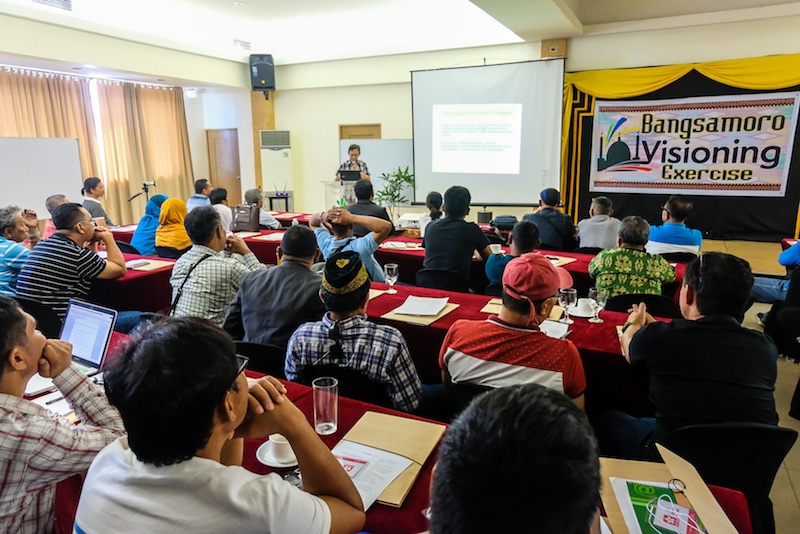GENERAL SANTOS CITY (MindaNews/03 November) – Peace stakeholders outside the proposed territory envision a Bangsamoro government that will “shun corruption and patronage politics” to spring the region out of poverty.
They also expressed hopes the Bangsamoro government will succeed and will also look at the welfare of Bangsamoro communities outside the core territory.
From November 1 to 2, at least 70 Moros and non-Moros from outside the proposed Bangsamoro territory gathered in this city to formulate their vision for the Bangsamoro government.
Simultaneous visioning exercises are being held in various areas in Mindanao from November 1 to 9, participated in by stakeholders within and outside the proposed Bangsamoro core territory.
 Peace stakeholders outside the proposed core Bangsamoro territory join the Bangsamoro Visioning Exercise in General Santos City on Nov 1 and 2, 2018. Visioning exercises by various sectors inside and outside the proposed core territory are being held simultaneously in key areas in Mindanao from November 1 to 9, their inputs to be presented to leaders of the future Bangsamoro government. MindaNews photo by AMIEL CAGAYAN
Peace stakeholders outside the proposed core Bangsamoro territory join the Bangsamoro Visioning Exercise in General Santos City on Nov 1 and 2, 2018. Visioning exercises by various sectors inside and outside the proposed core territory are being held simultaneously in key areas in Mindanao from November 1 to 9, their inputs to be presented to leaders of the future Bangsamoro government. MindaNews photo by AMIEL CAGAYAN
Besides practicing good governance, participants in the General Santos City visioning want the Bangsamoro government to improve basic social services, education and infrastructure facilities, which, according to them, are essential elements to free most of the Bangsamoro people from the bondage of poverty.
The Bangsamoro government will be established once RA 11054 or the Organic Law for the Bangsamoro Autonomous Region in Muslim Mindanao (ARMM) is ratified in the plebiscite on January 21, 2019. The Bangsamoro law is anchored on the Comprehensive Agreement on the Bangsamoro signed by the government and the Moro Islamic Liberation Front (MILF) in 2014.
Once ratified, the new BARMM will replace the 28-year old ARMM.
The proposed core territory of the BARMM comprises the ARMM’s Maguindanao, Lanao del Sur, Basilan, Sulu, Tawi-tawi and the cities of Marawi and Lamitan; the six towns in Lanao del Norte that voted yes to inclusion in the ARMM in 2001: Baloi, Munai, Nunungan, Pantar, Tagoloan, and Tangkal; and the 39 barangays in the towns of Aleosan, Carmen, Kabacan, Midsayap, Pigcawayan and Pikit in North Cotabato that also voted yes to inclusion in the ARMM in 2001.
Quraish Langcap, lead facilitator of the Bangsamoro Visioning Exercise here, said they are gathering the concerns of the Bangsamoro people outside the core territory so they can also be addressed by the Bangsamoro government, which will be led by the MILF during the transition period from 2019 to 2022.
The MILF-led Bangsamoro Transition Authority (BTA) will govern the area during the transition period and the first regular election will be in May 2022.
Stakeholders from the provinces of Sultan Kudarat, Sarangani and Davao Occidental and the cities of General Santos, Koronadal and Tacurong attended the activity here.
“It is essential for us to come up with a clear vision to achieve what we really want,” he said.
The participants also want the Bangsamoro government to work out the mandatory representation of the Bangsamoro at the local government units outside of the core territory, build farm-to-market roads at communities with dense Bangsamoro population and enhance madrasah education and health services outside of the BARMM, among others.
Rasul Ismael, assistant secretary at the ARMM’s Department of the Interior and the Local Government, revealed that MILF chair Al Haj Murad Ebrahim during a recent meeting in Davao City, said he wanted to hear the concerns of the Bangsamoro people outside the core territory.
“The BOL is our “last card.” Let us all do our part to help it succeed,” Ismael told the participants.
Recently, Sulu Governor Abdusakur Tan questioned before the Supreme Court the constitutionality of RA 11054.
But the law’s supporters expressed confidence that it would pass the legal challenge.
The Bangsamoro visioning exercise was facilitated by the Insider Mediators, a platform for Bangsamoro men and women from various sectors who try to work with their respective organizations to achieve a wider consensus on major Moro issues such as the Bangsamoro law, federalism and Marawi rehabilitation. The exercise was with the assistance of the United Nations Development Program.
The participants include members of the MILF, Moro National Liberation Front, internally displaced persons, professionals, indigenous peoples, women, youth, business, academe, Moro political leaders, sultanate or traditional leaders, Islamic leaders, civil society organization, persons with disability and the media. (Bong Sarmiento / MindaNews)
